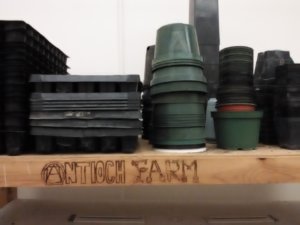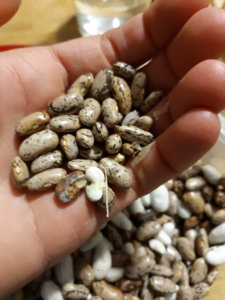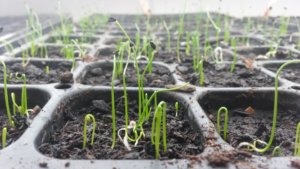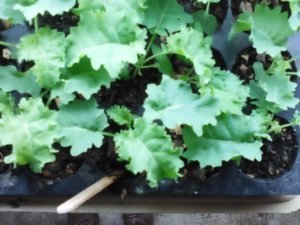Seeds: Spouting, Planting, Eating

In this year’s mild winter weather, the seeds seem to beg for early planting but we, as growers, know better. Snow will still come. However, being drawn to the company of something green and growing, we are starting seeds, by the hundreds, inside the Arts & Science Building. Student farm staff are busy planting these seeds winter term to prepare the Antioch Farm for spring.
Seed spouting has some interesting nuances. Some require stratification, that is a cold period, before sprouting, some require wet and warmth, or periods of both. Tucked among our seed supplies are small bags of seeds and soil in these various conditions: wild ginger, native ramp onion, milkweed. These, among others, will be added respectively to our medicinal native plant sanctuary, to our perennial food forests, and safe passage pollinator gardens.

Luckily, most common garden plants -tomatoes, lettuce, cabbages- just grow when you put them in earth with some water and warmth. The challenge of learning the more complex seed treatments, however, for students and experienced growers alike, can be intriguing.
 New to our planting list this year: A number of heritage varieties of dried beans. Bean seeds, a food native to North America, are still available in hundreds of distinct varieties, thanks to dedicated seed savers. These beans- Cherokee Trail of Tears, Painted Pony, Dragon’s Tongue, Lazy Housewife- are as unique in name as history and characteristics. Antioch staff and students will plant, harvest and process these beauties, providing another source of biodiversity for our pallets in the Antioch Kitchens. Some of our favorite seeds, of course, will be saved to plant the following year.
New to our planting list this year: A number of heritage varieties of dried beans. Bean seeds, a food native to North America, are still available in hundreds of distinct varieties, thanks to dedicated seed savers. These beans- Cherokee Trail of Tears, Painted Pony, Dragon’s Tongue, Lazy Housewife- are as unique in name as history and characteristics. Antioch staff and students will plant, harvest and process these beauties, providing another source of biodiversity for our pallets in the Antioch Kitchens. Some of our favorite seeds, of course, will be saved to plant the following year.
Winter Farm Facts
- If you pick greens when frozen, they wilt and rot quickly. However, if you wait until they thaw, they stay fresh. Greens that do this are arugula, Asian greens and cold hardy lettuces, among others.
- Our plastic hoop house keeps crops about 5° warmer. Add a layer of row cover and its 10°. Allowing crops to grow a month later into winter or a month earlier in the spring.
- Worms can tell you when compost is finished. A compost pile when cooking (or decomposing) is too hot for worms. Once finished, the worms return to the compost center indicating its ready for garden beds.
- Brussel sprouts grow on stalks, a sight that apparently makes Antiochians smile. Maybe the next unofficial mascot?




